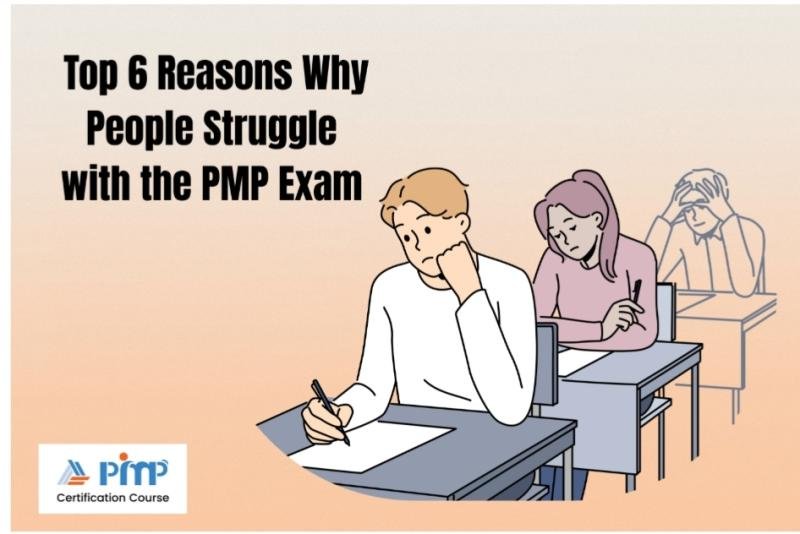
PMP Course
Ever wonder why so many smart professionals still struggle with the PMP exam? Taking a PMP Course https://www.pmpcertificationcourse.com/courses/pmp-certification-training is a great move, but passing the exam requires more than just attending classes. The good news? You are not alone, and the challenges are often fixable. If you have been wondering How Hard is the PMP Exam https://www.pmpcertificationcourse.com/blog/how-hard-is-the-pmp-exam, the answer depends on how well you prepare. With the right focus and a few strategic adjustments, you can avoid common mistakes and position yourself for success.
Let’s explore what usually holds people back.
Table of Contents
You Don’t Have a Study Plan
You Don’t Know the Exam Format
You Skip the PMBOK Guide
You Try to Cram It All
You Focus Too Much on Memorization
You Struggle with Situational Questions
Conclusion
1. You Don’t Have a Study Plan
A major mistake made by PMP candidates is starting preparation without a definite plan. The PMP exam covers a broad spectrum of subjects across multiple domains, and approaching it without a structured plan can resemble attempting to complete a puzzle with missing pieces. Choosing subjects at random or occasionally watching videos can cause misunderstandings and further confusion.
The course can be divided into more manageable, targeted sections with the aid of a solid study strategy. You may schedule time for each subject, monitor your daily development, and factor in revision time. It helps you stay concentrated, particularly when balancing work and school. Additionally, a study plan serves as a mental checklist, making you feel accomplished as you cross off topics.
2. You Don’t Know the Exam Format
Many people merely focus on the material and neglect to study for the exam. The format of the PMP exam contributes to its complexity. Suppose you were wondering how difficult it is. Knowing the correct answers is only one aspect of the exam but another is effectively navigating its structure. The exam lasts 230 minutes and consists of 180 questions. However, the questions’ format frequently shocks applicants.
You will encounter drag-and-drop types, matching things, multiple-choice questions, and multiple-response questions. You risk wasting significant time attempting to figure out these formats on the actual exam if you don’t practice them beforehand. Confidence comes from familiarity. For this reason, it is essential to employ practice exams that closely mimic the actual exam setting.
3. You Skip the PMBOK Guide
Some learners quickly steer clear of the PMBOK Guide because they believe it to be overly complicated or intimidating. Rather, they use summaries or condensed information from blogs and outside sources. The PMBOK Guide remains the official reference book for the PMP exam and continues to be crucial in determining how questions are phrased, even though it is also useful for making rapid changes.
PMI outlines all of the important procedures, subject areas, and best practices in project management. Reading it in addition to your other study resources helps you comprehend not just the answers but also the reasons behind their accuracy. This deeper comprehension has a significant impact on your level of confidence when taking the exam.
4. You Try to Cram It All
While cramming might have been effective in school, PMP is a different matter. Many candidates make the error of trying to fit everything in at once and delaying preparation until the final few weeks. This leads to high levels of tension and mental exhaustion.
Rather, spread out your planning over several months. Make time to review earlier material and study in brief, frequent sessions. This method enhances comprehension by allowing your brain to absorb information gradually. Additionally, it provides ample opportunity to review difficult subjects and strengthen your areas of weakness well in advance of the exam.
5. You Focus Too Much on Memorization
Although learning every input, tool, and output by heart may seem like progress, rote learning is not rewarded on the PMP exam. The purpose of the questions is to assess your application of topics rather than your memorization of them. The use of well-known phrases in unusual contexts confuses many applicants.
An application-based study is the most effective approach to this problem. Pay close attention to how decisions are made in actual projects and the rationale behind the usage of particular procedures. Consider yourself more like a project manager than a exam-taking learner.
6. You Struggle with Situational Questions
Situational inquiries can be especially challenging. They ask you what you would do if you were put in a hypothetical situation. Although the responses frequently appear to be equally valid, you must choose the one that more closely aligns with PMI’s philosophy. This calls for exercise in both critical thinking and reading.
Many candidates use their own job experience, which may not align with PMI’s preferred approach. Therefore, it’s crucial to learn how the PMI handles problems and adjust your perspective on them. Practicing these questions can help you improve your thinking and recognize how they are framed in a pattern.
Conclusion
Struggling with the PMP exam is common, but not inevitable. By understanding what causes others to fall short, you can plan smarter and stay on track. With the right mindset, focused study, and consistent effort, success is within reach. Consider PMP Training to gain expert guidance and approach the exam with confidence from day one. Your certification journey can be a winning one.
P.O Bagarji Town Bagarji Village Ghumra Thesil New Sukkur District Sukkur Province Sindh Pakistan 65200.
Wiki Blogs News always keeps careful online users to provide purposeful information and to keep belief to provide solution based information.
This release was published on openPR.

